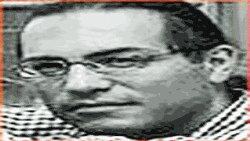<!-- IMAGE -->
Washington-based democracy activist Ammar Abdulhamid says virtually no progress has been made in opening up the political system in his native Syria since he fled the country more than five years ago. He and his family were forced into exile in 2005 because of his outspoken criticism of the regime.
Abdulhamid says the situation has instead grown “increasingly dismal,” with more crackdowns on political opponents than ever before.
Mr. Abdulhamid, founder of the Tharwa Foundation, an organization dedicated to promoting democracy and human rights in Syria and throughout the Arab world, recently spoke with Carol Castiel and VOA TV reporter Mohamed Elshinnawi on VOA’s Press Conference USA.
Abdulhamid founded the Tharwa Foundation with other civil dissidents in an attempt to launch a democracy movement in an often-conflicted “multiethnic, multi-religious” society. The Foundation, Abdulhamid says, tries to promote democracy that appeals to “all communities in Syria.”
Syria’s population is predominantly Sunni Muslim, with minority Alawite, Druze, and other Muslim sects, as well as numerous Christian groups.
But Abduhamid says that it is in Damascus’ interest to prevent the communities from working together since they would constitute a direct challenge to the regime. Damascus, he says, prefers to “play these communities against each other” to maintain its power and legitimacy in the country.
“I think the regime has really managed to reassert its authority on certain levels, but the disenchantment is growing,” Abdulhamid said. “[The people] are not happy with the status quo.”
Abdulhamid says growth in the network of activists at the Tharwa Foundation “shows that there is a grassroots constituency for more liberal democratic societies” in the Middle East.
The Tharwa Foundation seeks to empower young leaders, providing training workshops on civil disobedience methods, citizen journalism, and how to interact with local communities “on their own level.”
<!-- IMAGE -->
Regarding US policy toward Syria, in contrast to the Bush administration, President Obama has pursued a policy of engagement marked by high-level envoys and the pending nomination of a U.S. ambassador to Syria. Washington would like to pry Damascus from its tight alliance with Tehran and encourage peace talks between Syria and Israel.
However, Abdulhamid is skeptical of this approach, and says Middle Eastern regimes “are not necessarily interested in improving ties with Western countries.” “[For them], dialogue is just stalling for time … to deflect pressures and demands for reform.” The regimes, he says, are “willing to talk until they’re blue in the face,” but are not willing to “do anything.” And Abdulhamid does not believe Syria will loosen its alliance with Iran any time soon. He says Syria is seen as “a pariah regime” by many of its Arab neighbors.
Abdulhamid criticizes both the Obama and Bush administrations for pursuing an “either/or” approach to the Middle East. The Bush administration pushed for democracy promotion but spurned engagement. The Obama administration, on the other hand, is pushing for dialogue while playing down human rights.
Abdulhamid contends that engagement and action on the democracy front should be pursued simultaneously, as “tension is not a problem for Middle Eastern regimes.” In Middle-Eastern mentalities, he says, “You can always do everything at the same time: you can talk peace, and you can prepare for war, and you can push for democracy.”
While Abdulhamid says he does not believe the Obama administration is naïve in its ability to influence Syria’s government, he says perhaps it should “temper its expectations.”
To listen to the interview in full click here.




